STEREO REVIEW'S SELECTION OF RECORDINGS OF SPECIAL MERIT--BEST OF THE MONTH
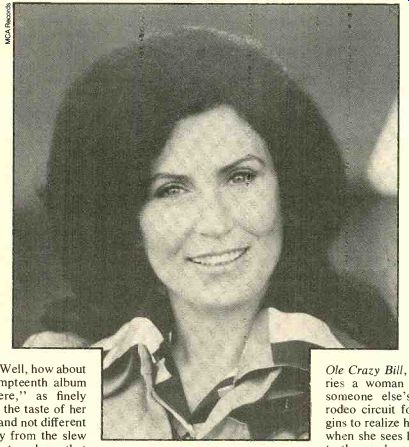
--- Loretta Lynn: a Hill-country Dietrich with a Steadily Widening Sphere of
Musical Influence.
So what else is new? Well, how about Loretta Lynn's umpteenth album "Somebody Somewhere," as finely honed down (or up) to the taste of her market as ever before and not different in any appreciable way from the slew that preceded it, except perhaps that here she doesn't do any of her own songs.
But for those of you who haven't been paying much attention, there is a difference, and it has to do with the fact that Loretta Lynn long ago moved beyond the narrow confines of being just a hugely popular c-&-w singer and has become an exceptional personality in almost every performing medium.
You see, along with her undoubted good-ole-gal earnestness, sincerity, and honesty, to say nothing of her skill in communicating these qualities (no body goes nowhere in the c-&-w field without them), there is also a wry sexiness, a sly wit, and a gutsy realism about her performances that makes her a kind of hill-country Dietrich.
And can she ever put you on in such cameo confessionals as Somebody Somewhere (Don't Know What He's Missin' Tonight): "Lord l need some one, but ev'ry one I know is away being/Needed at home. . . ." Another example is While He's Making Love (I'm Making Believe): "When he tells me he needs me, I try hard to please. . . ." Both are sung with the head-on, blank-stare coolness that is twice as effective as any amount of stuck-valve rant, and both are there fore funny and touching and real.
On the more serious side is Me and Ole Crazy Bill, about a man who marries a woman already pregnant with someone else's baby. They try the rodeo circuit for a while, and she be gins to realize how much she loves him when she sees him "passing out cigars to the cowboys/Like my baby was his own. . . ." I realize that that reads more like True Confessions than True Life, but suspend judgment until you hear Loretta sing it; she performs it with a sober, earthy dignity that will give you pause for the little while it takes to glance into a world perhaps a little less wide than your own.
Such songs (I'll Leave the Leavin' Up to You is another), made up one part each of woman-of-the-world stoicism and understanding compassion, suggest that Loretta Lynn is a lot more than the c-&-w money machine, the empress of the truck-stop juke box, that much of her publicity has suggested. whatever else she is-stars of this magnitude are, after all, a category unto themselves-she is a superb entertainer, and this new album is another splendid demonstration of how she got to be one. Okay, city slickers, let's see you give up some of your narrowness and give the lady a listen. You're probably in for a surprise.
-Peter Reilly LOIRETTA LYNN: Somebody Somewhere.
Loretta Lynn (vocals); orchestra. Some body Somewhere; Sundown Tavern; The Game That Daddies Play; While He's Making Love; Crawling Man; Me and Ole Crazy Bill; I'll Leave the Leavin' Up to You; Your Woman, Your Friend; Playing with Fire; Blue Eyed Kentucky Girl. MCA MCA-2228 $6.98,10 T-2228 $7.98, C-2228 $7.98.
-----------------------
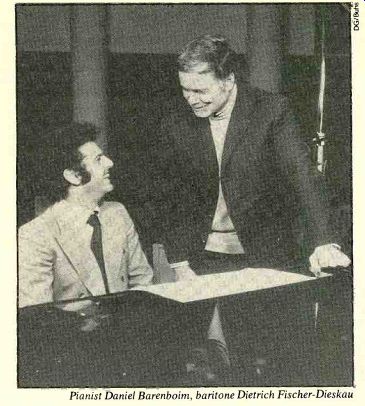
------ Pianist Daniel Barenboim, baritone Dietrich Fischer-Dieskau
Hugo Wolf Lieder by Fischer-Dieskau and Barenboim: Performance In the Great Tradition
WHEN he was in the mood, Hugo Wolf wrote songs almost as fast as Dietrich Fischer-Dieskau can record them. He would immerse himself in the works of a poet and fling off whole books of settings at an extraordinary rate-sometimes two finished songs a day. What is really extraordinary, of course, is not the quantity but the quality of the output. The level of musical inspiration as well as of compositional craft is, if possible, even higher than it is in Schubert.
Wolf is sometimes thought of as a Wagnerian, but he really belongs in the Schubert-Schumann-Brahms-Bruckner line, of which he is a late and quite original representative. Wolf's particular genius was in finding an intrinsic musical idea and form for each work which, even while they closely followed the poetic ideas of the literary subject, al ways kept to the highest standards of invention, continuity, and coherence.
These characteristics make his songs outstanding subject matter for a highly expressive performance style in the great tradition, which is exactly what they get from Fischer-Dieskau and Daniel Barenboim in a new three-disc set from Deutsche Grammophon. The depth of poetic insight and the intensity of expression provided by these two artists pivot precisely on the texts with out losing one thread of musical line or one gram of artistic integrity.
This is the second volume of a massive Wolf project being mounted by DG, and it includes forty-two of the fifty-one songs in Wolf's Goethe al bum. Written between 1888 and 1889, these songs include some of Wolf's greatest and best-known works Prometheus, Ganymed, Epiphanias, Anakreons Grab-and some of the lesser-known songs from the "West ostlicher Divan." But they are almost all good, one gem after another superbly sung and played. The Heine and Lenau songs, mostly early and Schumannesque, are on the whole less extraordinary--but who's quibbling? Full texts and translations are provided, and this is one case where it is best to use them-not only to follow the literary ideas, but to savor the subtlety of Wolf's settings and the poetry of their interpretation.-Eric Salzman WOLF: Lieder on Poems by Goethe, Heine, and Lenau. Goethe: Anakreons Grab; Be herzigung, I and II; Blumengruss; Coph tisches Lied, I and II; Dank des Paria; Der Harfenspieler, I, II, and III; Der Neue Amadis; Der Rattenfanger; Der Sanger; Der Schafer; Dies zu Deuten Bin erbotig; Epiphanias; Erschaffen und Beleben; Frech und Froh, I and II: Fruhling ubers Jahr; Ga nymed; Genialisch Treiben; Gleich und Gleich; Grenzen der Menschheit; Gutmann and Gutweib; Hatt' ich Irgend Wohl Bedenk en; Komm, Liebchen, Komm; Koniglich Gebet; Locken, Haltet Mich Gefangen; Nicht Gelegenheit Macht Diebe; Ob der Koran von Ewigkeit Sei; Phanomen; Prometheus; Ritter Kurts Brautfahrt; Solang Man N uchtern Ist; Spottlied; St. Nepomuks Vorabend; Trunken Mussen Wir Alle Sein; Wanderers Nacht lied; Was in der Schenke Waren Heute; Wenn Ich Dein Gedenke; Wie Sollt Ich Reit er Bleiben. Heine: Du Bist wie Eine Blume; Madchen mit dem Roten Mundchen; Mit Schwarzen Segeln; Spatherbstnebel; Wenn Ich in Deine Augen Seh'; Wie des Mondes Abbild Zittert; Wo Wird Einst. Lenau: Abendbilder; Frage Nicht; Herbstent schluss ; Herbst. Dietrich Fischer-Dieskau (baritone); Daniel Barenboim (piano). DEUTSCHE GRAMMOPHON 2740 156 three discs $23.94.
---------------------
RCA's New Forza del Destino Holds Its Own Amid Some Formidable Catalog Competition
VERDI'S La Forza del Destino, a complex and demanding opera, has fared remarkably well on records.
Indeed, in the long list that runs all the way back to the marvelous first complete version accomplished in wartime Italy (by Caniglia, Masini, Pasero, and others), there isn't one that fails to do the music justice or that does not contain at least one cherishable contribution. A new set by RCA (the third by that company in some sixteen years) now takes on the formidable competition-and holds its own admirably.
Presiding over a cast of outstanding singers, conductor James Levine gives renewed evidence of his natural gifts as a Verdi interpreter. In the early scenes there is more efficiency than true inspi ration in his work, but as the performance takes shape the listener is won over by the clarity, vitality, and discipline of his leadership. There are crisp attacks and a steady momentum. He no longer drives the singers as he once did; occasional excesses in this area (the rushed finale of the Inn Scene, for one) are far outnumbered by brisk but eminently right-sounding tempos. The little Preghiera in the second act is handled with a fastidious care befitting Verdi's Requiem, and the singers are equally fastidious as a consequence. In short, this kind of Verdi conducting need not defer to the much admired work of such Italian veterans as Tullio Serafin and Lamberto Gardelli in other Forza sets.
As the vengeful Don Carlo, Sherrill Manes has rarely sounded better. His gallery-pleasing inclinations are held in check, and he uses his sizable baritone intelligently within an impressive range of dynamic and timbral variety. The recitative preceding his aria "Urna fa tale" is meaningfully projected; the aria itself is somberly introspective, and that makes the explosive cabaletta all the more exciting. The crucial scenes between Don Carlo and Don M varo display a remarkable rapport be tween two artists at their peak. In the latter role, Placido Domingo excels with his appropriately melancholy sound and his exemplary legato; his intonation, however, has been more careful on previous occasions.
This is Leontyne Price's second Leonora on discs, and though it is not quite as impressive as her first (RCA LSC-6413), her musicianship is as strong as ever, her attacks are clean, and the tone above the staff has the radiance of old. Unfortunately, much of the part lies in the lower mid-range (never the happiest area for her voice), and there she sounds unappealingly raw, lacking in Italianate warmth. And too, there is a rather passionless quality to her singing in the first act. But she sounds like her early self in the Con vent Scene, where she is eloquently partnered by Bonaldo Giaiotti, a majestic-sounding Guardiano.
Fiorenza Cossotto's light-toned, accurately sung, and cleanly ornamented Preziosilla is a delight (despite two B naturals that are a shade under pitch), ...
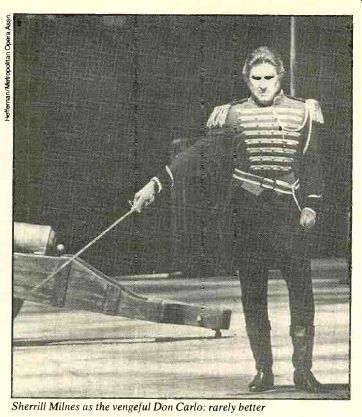
---- Sherrill Milites as the vengeful Don Carlo: rarely better
... and Gabriel Bacquier's colorful Melitone makes almost visible his unforgettable interpretation of the role at the Met a few seasons ago. Kurt Moll is outstanding as the short-lived Marquis de Calatrava, and Michel Senechal is an amusing Trabucco. The choral singing is first-rate and so is the orchestra, paced by splendid violin and clarinet solos.
I will not place this new set above the others currently available (London 1405, in particular-with Tebaldi, Del Monaco, Bastianini, and Siepi, all in peak form-has not lost its magic for me throughout the twenty years of its existence), but I doubt that I will ever part with it. I recommend it very highly despite the fact that RCA's well-annotated album is encased in an unattractive and ill-fitting box that is sure to offend some buyers-especially given the price.-George Jellinek VERDI: La Forza del Destino. Leontyne Price (soprano), Leonora; Placido Domingo (tenor), Don Alvaro; Sherrill Wines (baritone), Don Carlo; Fiorenza Cossotto (mezzo-soprano), Preziosilla; Bonaldo Giaiotti (bass), Padre Guardiano; Gabriel Bacquier (baritone), Fra Melitone; Michel Senechal (tenor), Trabucco; Kurt Moll (bass), Marquis de Calatrava; Gillian Knight (mezzo soprano), Curra; Malcolm King (baritone), Mayor of Hornachuelos; others. John Alldis Choir; London Symphony Orchestra, James Levine cond. RCA ARL4-1864 four discs $31.92.
-------------------
Jeremiah Ingalls and Hezekiah Moors: Vital, Beautiful Music From Old New England
IF William Billings (1746-1800) was the giant among the New England psalmodists whose heyday (1770-1810) marked the first creative outpouring of a wholly original American music, at least a dozen of his singing-schoolmaster confreres and part-time composers (they were tavern keepers, farmers, and comb makers also) produced pieces of comparable rhythmic vitality, stark loveliness, and raw power.
Justin Morgan (of horse-breeding renown), Daniel Read, Supply Belcher, and Jeremiah Ingalls are but a few of those who come to mind, and their hymns and anthems, as well as Billings', are still to be heard these two hundred years later at the Sacred Harp singing conventions beloved of the rural South. For when the more "cultivated" musical styles imported from Europe drove the community singing schools and their highly individual mu sic from the New England scene, the home-grown products quietly de-camped and were reborn in the American South. Only over the past twenty ...
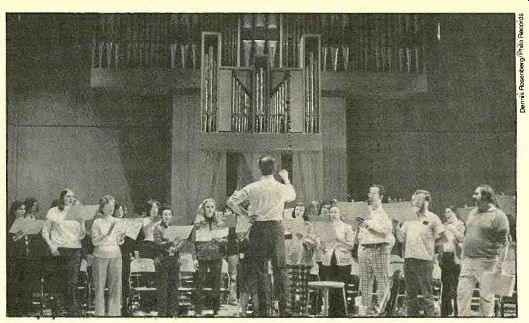
-------- James Chapman conducts the Vermont Choral Union: masterly
performances of early American music.
... years has there been any active interest in the North toward reviving the work of the so-called New England tune-smiths in authentic performance.
An excellent example of such performance is contained in a compendium of Federal-period New England psalmody done for the Vermont-based Philo label (see STEREO REVIEW, Jan. 1977, page 78) by the University of Vermont Choral Union. It is equaled in vitality and beauty only by the remarkable 1960 University of Maryland Chapel Choir disc issued by Washington Records and now long out of print.
Besides offering a fine collection of the work of the relatively well-known Jeremiah Ingalls (1764-1838), the Vermonters have unearthed the music of Hezekiah Moors (1775-1814), whose name is to be found in no standard reference work but whose music is certainly richly deserving of a renown it never attained during the brief lifetime of its author. Moors died at thirty-nine, five years after publication of his single tune-book, The Province Harmony.
Space does not permit going into bio graphical detail here concerning Ingalls and Moors, but fortunately the Philo package offers copious annotation, full texts, and information on how scores may be obtained from the Vermont University Choral Union (this is music that deserves the widest circulation and performance).
Among the compositions I would single out from the Ingalls group are such items as the folk-like Christian Song with its effective word painting, the elaborate Falmouth with its vigorous "fuguing" episodes and unprepared key shifts, the starkly beautiful Fare well Hymn, and the poignant Lamentation. The rendition of Ingalls' most famous tune, Northfield, is highlighted here by being given in both its church version and its highly amusing secular one.
In the works of Hezekiah Moors we encounter a far more sophisticated harmonist, one who bridges the gap between the stark primitivism of the "tunesmiths" and the cultivated style that was to gain dominance within the decades to come. In Dorset and Pitts ford we find the "fuguing" devices of the older composers, while in Orwell and Mount-Holly we have stunning examples of Moors' singular gift for gorgeous, densely packed harmonic textures. Remarkably effective, too, is the anthem By the Offence of One, which is through-composed in a kind of arioso recitative .
Unlike the Vermont Choral Union's first album (Philo 1000), which, though it offered a marvelous collection of music by composers native to or associated with Vermont (including all the extant work of Justin Morgan), was inadequately recorded and rather ineffectively sung, this "Vermont Harmony 2" disc is an altogether masterly production from every standpoint. One can only wish that the contents of the earlier disc might now be rerecorded under comparable conditions. Mean while, I rate this as one of the half-dozen finest discs of American music to come out of the Bicentennial year.
-David Hall
VERMONT HARMONY 2. Ingalls: Love Di vine; Christian Song; Falmouth; Farewell Hymn; New Jerusalem; Crostic; Lamentation; Delay; Tranquility; Northfield; Election Hymn. Moors: Cavendish; Charlotte; Dorset; Plainfield; I Will Praise Thee Anthem; Pittsford; Fairfax; By the Offence of One-Anthem; Moretown; Shirley; Orwell; Mount-Holly. University of Vermont Choral Union, James Chapman cond. PHILO 1038 $5.98 (available from Philo Records, The Barn, N. Ferrisburg, Vt. 05473, or from some local dealers).
-----------
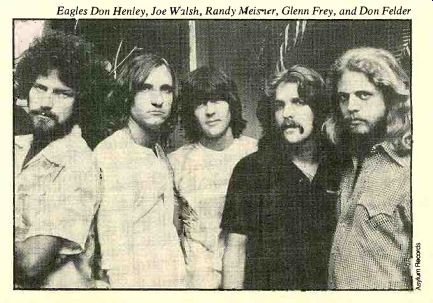
-------- Eagles Dan Henley, Joe Walsh, Randy Meister, Glenn Frey,
and Don Felder
The Eagles' New "Hotel California": High Standards and a Tight and Tidy Vision
TRY not to get too hung up on how middle-class their backgrounds may be, or whether there's any real sagebrush sticking to their spurs; the Eagles are pros and they try to represent themselves honestly. In their new "Hotel California" their professional standards are pretty high, and the result is a satisfying, well-turned album.
The most commercial song, New Kid in Town, has more depth than we have any right to expect of the most commercial track in the latest album by a group with a large and faithful follow ing already primed to salivate at the sound of the opening chords. I mean the Eagles could get by with a lot more coasting than they do in this instance.
They could take more chances, too, of course, but this one seems to suggest that that may be a matter of constitution: their vision is tight and tidy; they don't have individual genius or a hot dog soloist in their midst, but versatile part players and cooperators thinking Arrangement and Detail.
There is good contrast here between the acoustic and the electric aspects of their style, a smattering of dandy if derivative melodies (check Wasted Time and The Last Resort), some lyrics that reflect actual thought, and first-rate, un-fancy vocals. I never thought I'd be praising a "group mentality" all over the place, but I guess it depends on what the group mentality does. Or maybe it's just rare to find a group that has a mentality. Whatever, the Eagles have harnessed something here and made it do some fine work.
-Noel Coppage
THE EAGLES: Hotel California. The Eagles (vocals and instrumentals). Hotel California; New Kid in Town; Life in the Fast Lane; Wasted Time; Victim of Love; Pretty Maids All in a Row; Try and Love Again; The Last Resort. ASYLUM 7E-1084 $6.98, ET8-1084 $7.98, TCS-1084 $7.98.
------------------
Opus 77: the Last And the Greatest of The Great Haydn String Quartets
IN 1799 Joseph Haydn wrote to his publisher Breitkopf: "Oh God, how much remains to be done in this splendid art, even by such a man as I have become!" Haydn was never immodest, but he had a very good idea of what he had accomplished: he had brought both the symphony and the string quartet to their highest level of development and capped his own production in both forms with valedictory works that surpassed all their predecessors. His last and greatest symphonies were then four years behind him; the last and greatest of his completed string quartets-the pair published as Op. 77 were written that very year.
Both of these quartets are miraculous works-so rich, so varied, so well balanced, so altogether perfect that one hardly thinks of their having been thought up, laid out, and written down, any more than one thinks of a sunset or any other natural phenomenon as being "composed." Haydn himself was acquainted with this sort of reaction to his works, and, while it is of course complimentary, he complained that "no one will believe the strain and effort it costs to produce them." Such works, in other words, do not write themselves, and they don't play them selves either, but "strain and effort" are the last things likely to come to mind in listening to the Tatrai Quartet's superb performances of these two masterworks on a new Hungaroton disc.
The Tatrai set of the six Op. 76 quartets issued a dozen years ago (Qualiton SLPX-1205/1207) is one of the glories of the Haydn discography. Whether it is because these musicians reside in a center of Haydn scholarship or be cause they were simply born to play Haydn quartets, their identification with this music makes itself felt as exceptional and complete. Twelve years was a long time to wait for a second installment in what I hope may yet be a survey of the complete cycle, but I'm glad it was Op. 77 that was chosen this time, for there has not been a fully successful realization of this towering pair on records since the Haydn Society is sued the great Schneider Quartet versions a quarter-century ago.
In both outline and detail, the Tatrai approach is similar to the Schneider.
Yet the playing here has still more sweetness, rhythms are somewhat firmer (without any suggestion of rigidity), and the first-rate modern recording brings out the bloom on the individual and collective string tone as the players themselves bring out the amiable, witty, poignant, audacious, brilliantly inventive character of the respective movements. The Tatrai performances happily parallel Haydn's own achievement in Op. 77 in being the finest thing this group has given us, yielding new and deeper pleasures with repeated hearings. Although 1977 has hardly be gun (this review was written on New Year's Day), I expect this to be my chamber-music record of the year when the tally is made next winter.
-Richard Freed
HAYDN: String Quartet in G Major, Op. 77, No. 1 (Hob 1H: 81); String Quartet in G Major, Op. 77, No. 2 (Hob. HI: 82). Tatrai Quartet. HUNGAROTON SLPX 11776 $6.98.
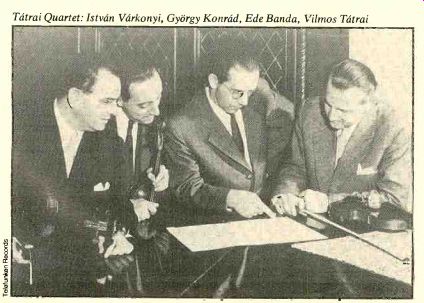
----- Tcitrai Quartet: Istvan Vcirkonyi, Gyorgy Konrcid, Ede Banda, Vilmos
Tatrai
-----
----
Also see:
CLASSICAL DISCS and TAPES: The French Bidti, GEORGE JELLINEK; Head to Head on Beethoven's Nine, KAREN MONSON; Weber/Mahler: Die Drei Pintos, ROGER C. DETTMER